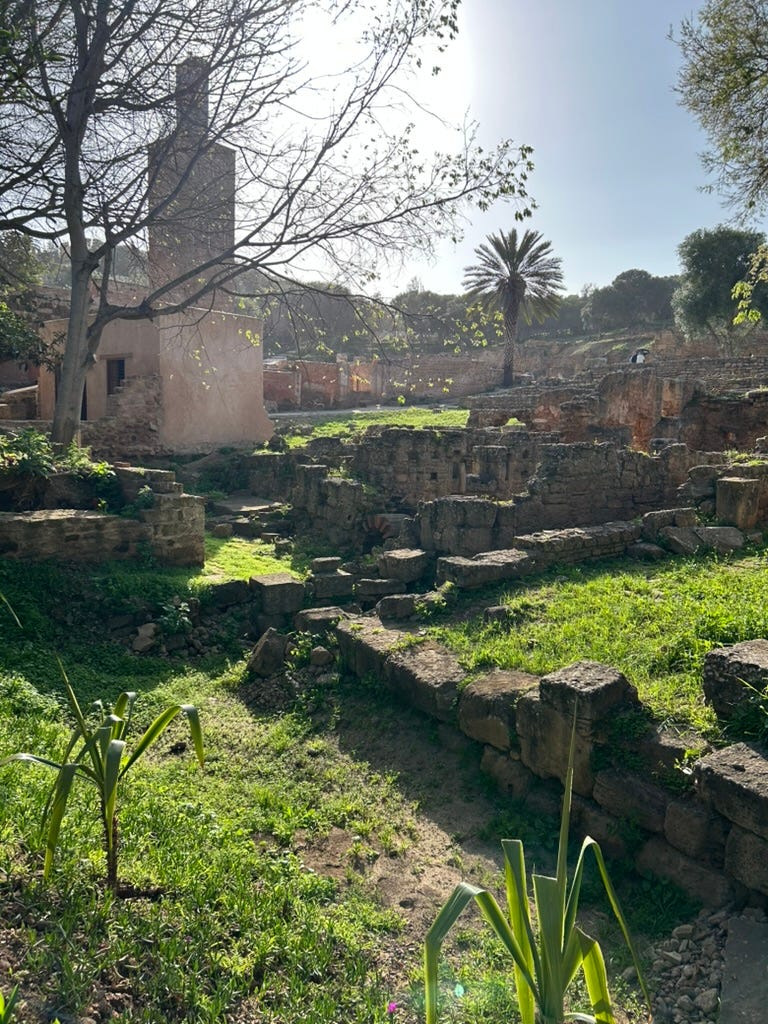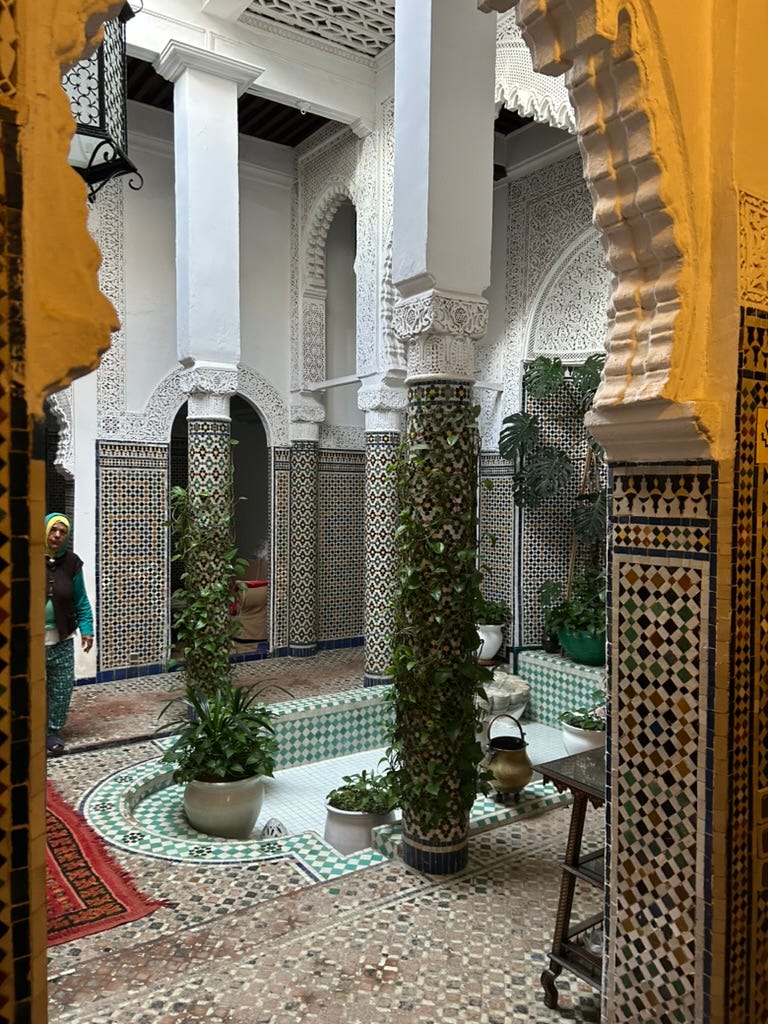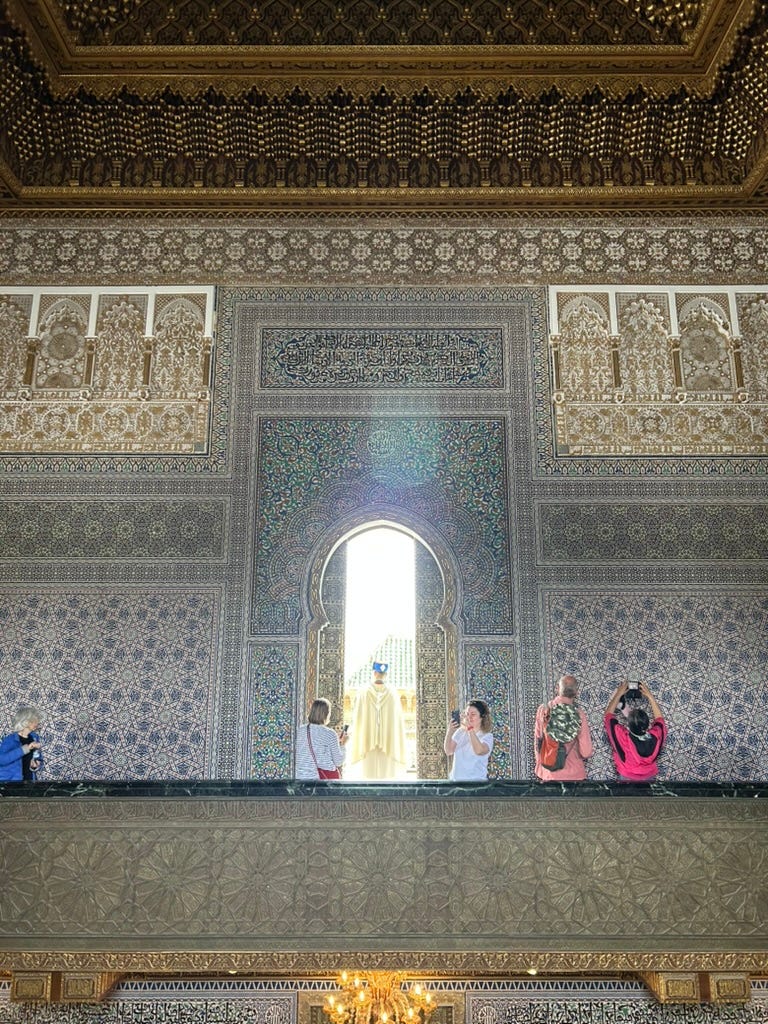A Minute Archeology of Rabat
A post card-sized glimpse of a generation about to give way to the next.
Last week I took a trip to Rabat with Simon and Michel. Simon grew up there, the son of a French mother and a half-French, half-Moroccan father who was a math and physics professor to the kids of the King. Having long since left the city for Bordeaux, the family maintained the apartment, a modest three-bedroom, which Michel and Simon have the run of now that Simon’s mother has passed, and his father is infirm. They go down a couple times a year and come back with glazed pottery and stories.
If Marrakech is all you know, Rabat is the polar opposite. It’s orderly and pristine rather than chaotic, and administrative rather than tourist-powered. It’s where King Mohammed VI lives in a massive palace complex, and clearly he puts the hammer down hard in his immediate vicinity, because in the central city, the trees are sculpted, the lawns are clipped and bright green, and the roads are freshly paved. Even inside the dusty peach crenellated ramparts delineating the medina, the souk has been renovated.
“I know what I’m about to say is bullshit,” I said to Michel as we were walking to visit Chellah, a necropolis and garden with 8th century foundations built up layer after layer over six hundred years, “but if you look around, it’s almost like there is no poverty here.” He just laughed. Of course there is. Like everywhere else, it just keeps getting pushed further and further out.
And Old Boy plays hell with the outskirts too now, claiming imminent domain and razing whole neighborhoods to build tacky condos and hotels, ostensibly for the World Cup in 2030. Who knows how many people will make it over now that the global economy is looking doomed. Maybe it’s all Emirati money laundering, though do you even have to launder money in a monarchy when you can just take shit? Driving around, Michel and Simon would suck their teeth and bemoan the destruction of another streamline moderne.
They are thinking about buying a riad, a traditional home arranged around an open-air atrium. The best deals are in the medina of Salé, technically a suburb of Rabat, but its own proper little city just across a bridge, knifed through by scooters choking out diesel fuel and skinny cats poking around outside of fried fish joints. It’s unclear whether a male couple would be safe there. Women aren’t often completely covered in Morocco, but touring one place in Salé, a dilapidated jewel riddled with zellige tiles and lacy molding and fountains and not enough light and way too many rooms, on that bright sunny day we saw several all-black-clad ladies with sunglasses perched over their one feeble eye slit. A Moroccan friend of Simon’s family calls them ninjas. She does not approve.
In pharmacies and small shops and in every stand in every souk, there is a photo portrait of Mohammed VI. Where these images once were stern, with the royal in military dress, the trend for the king now appears to be an easy-breezy lifestyle mood. I saw him in country casual flannels and shades posing with his insipid looking son, and reading at his desk with vibrantly gelled hair. I think there will be a selfie next. This king is thirsty.
The point of the visit was for Simon to do paperwork and for us to hang out and buy djellabas and eat home-cooked tagines prepared by Najat, the daughter-in-law of Simon’s parents’ housekeeper, Fadila, who is still on the payroll despite only being called into service now when Simon and Michel are in town. That’s what you do for someone who calls you “mon fils” and means it, and who cleaned your plate for you when you were little and got banished to the kitchen for not finishing your dinner, so that you could go back out into the living room and rejoin polite society. Fadila copped hashish once or twice for a teenage Simon. Now that Michel is on the scene, and he and Simon are wearing wedding rings and sleeping in the same bedroom, she still openly wonders when he is going to find a wife. Not seeing things when they are in front of your face can be a gift.
Simon stays in touch with the closest of his parents’ friends, several of whom still live in the building, a hive for an aging generation of pieds noirs. That’s how they refer to themselves, so I won’t quibble with dictionary definitions that say the term is for French-Algerians who took the wrong side in the Algerian war. Simon’s people weren’t landowners or capitalists or militants, but teachers. A dinner invitation to one of them, Marie-Chantal, formerly a math prof, became an invitation to them all, which is how we ended up hosting four very elderly people midway through the trip.
“You remember that episode of Seinfeld where Jerry tries to save a restaurant going out of business, and keeps repeating to himself, ‘I am a good person. My mother was right about me’?” Michel asked. I laughed. Filial duty was being performed though perhaps the point is the duty rather than the performance. Everyone’s motivations are complex, and we were all going to eat well. We set out dining table chairs and olives and potato chips, and Simon went to get more wine, which we suspected rightly wouldn’t be in high demand.
The first two to arrive were Aline and Rachelle. I had met Aline two days before, at a coucous lunch thrown by another friend of Simon’s family, a former army doctor who treated one of the spouses of one of the kings. (Trying to be discreet here by not naming which king, because the reviews of her former client are not great. Apparently, she was a toxic crazy bitch.)
Now retired, our doctor has a hundred-year-old whitewashed house next door to a mosque a block from the beach in one of the neighborhoods currently under the chopping block. It has timber ceilings and a proper salle marocaine, or a reception room lined with brocade banquette couches and stiff throw pillows. Madame la médicin insists they will have to force her out of the place if they try to knock it down, but perhaps the presence of the mosque will spare her.
Now she spends her time taking in stray dogs and cats, none of whom she does much to discipline. The rule of the house is not to put your purse on the floor or one of the six? seven? little shits would pee in it. The yappiest, a Lhasa Apso with a kicky short hairdo, was so territorial he earned the nickname Benjamin Netanyahu, but it was the longhair chihuahua who ended up humping Michel’s arm during tea.
In her late 80s, with pearl-gray curly hair, Aline wears hearing aids and is nearly blind, but still she manages to pencil on henna-colored eyebrows with impressive precision, perhaps due to her former profession as a beautician and manager of a posh boutique on the Avenue Mohammed VI. (You will have to pry my lipliner from my dead hands; I see you, Aline.) She had been having a hard time finding motivation to leave the house since losing her daughter the previous year, but rallied with the help of Farah, her home aid, a radiant woman in her 30s who sat next to her at lunch to help her manage the couscous. Farah caressed Aline’s hand and spoke to her gently and never left her side. I had never met Aline so had nothing to compare her current state to, but there was something ghostly about her.
Aline shares Farah with Rachelle, who lives one floor up, just across the hall from Simon, and who has fairly advanced Parkinson’s disease. Though now stooped, her milky green eyes sparkled and her layered bob haircut, like Princess Diana’s when she could be convinced to put down the hairspray, was fresh. The appliquéd pearls on the neckline of her pink angora sweater caught the light as she leaned to one side in her chair while we had drinks before dinner. “It’s OK, I lean all the time,” she said when I reached to steady her wine glass before its meager contents spilled on the rug that Fadila protected so ferociously we weren’t even allowed to step on it in slippers.
When we all sat down to dinner—conveniently a beef tagine with prunes—small talk was made for the sake of the new blonde with the American accent. Rachelle, once the Spanish teacher to the thirsty king and his siblings, told us about learning Italian when her father would read the family the newspaper around the table. Normally they spoke Piedmontese, so along with her perfect French and Arabic, that made five languages. She thanked Aline for showing her how to get up when she falls, by turning onto her side and crawling until she can find support.
Marie-Chantal complimented Rachelle on still having so much facial movement, and Rachelle explained that she does daily exercises pulling grimaces to keep the muscles moving. She also empties out bags of dried beans so she can put them back, bean by bean, to keep her hands from freezing.
At one point, as the dinner guests were catching Simon up on who saw their children still (not enough of them) and other small-seeming but gigantic details of their lives, I flashed back to a conversation I had for a book project with a Scottish astrologer named Anne Whitaker, who is now in her late 70s. “Age takes everything away from you,” she said. “Getting older is a process of gradually letting go of everything, and eventually you have to let go of your life.”
I chewed on the cinnamon-spiked vermicelli we had with the tagine—the name of the dish translates to “poetry of saffa”—and brushed away tears that I hoped nobody would notice. If they asked, I would tell them it was allergies. Maybe everyone was just pulling a Fadila, but I think I fooled them. When it was time to go, I hauled Rachelle out of her chair and stood behind her with my arms out like handlebars for her to grab onto, and walked her down the hall to her door. Farah answered, groggy from having fallen asleep. She doesn’t live with Rachelle, or Aline, but she was there that night to help them both get back to bed.








So glad you are sharing your crystalline observations and that your memory is full of those fine details for our pleasure.
A wonderful read as always. Thankyou.